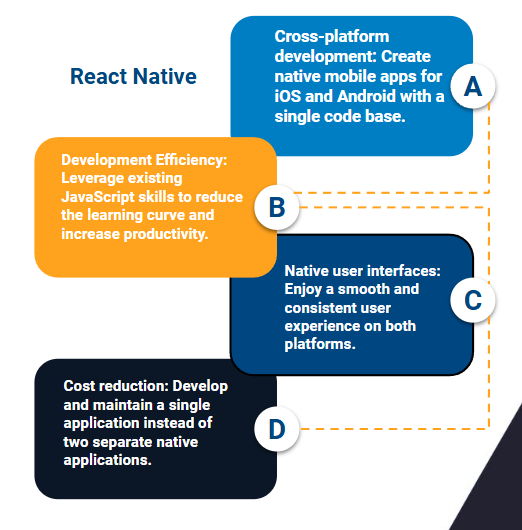In the dynamic world of mobile app development, React Native has become a rising star, wowing developers with its promise of creating cross-platform native apps using JavaScript. But what programming language is hidden behind this powerful tool? Let's take a deeper look to discover the languages that bring React Native apps to life.
Imagine a scenario where a developer, armed with the knowledge of a single language, can create fluid and engaging mobile apps for iOS and Android. That scenario has become a reality thanks to React Native, an open source framework that allows developers to use JavaScript to build native user interfaces. But how is this possible? The key lies in the combination of two programming languages: JavaScript and the native language of each platform.

JavaScript: The core language of React Native
JavaScript, the language of the web, is at the heart of React Native. This dynamic and versatile language provides the foundation for application logic, user interaction, and user interface rendering. Developers with JavaScript experience can leverage their existing skills to create React Native applications, reducing the learning curve and increasing efficiency.
Native languages for specific platforms
While JavaScript handles the core logic, React Native uses each platform's native languages to render the user interface natively. This means that to create a React Native app for iOS, Swift or Objective-C is required, while for Android, Java or Kotlin is used. These native languages ensure that the app looks and feels like a native app on each platform, providing a smooth and consistent user experience.

React Native: A bridge between languages
React Native acts as a bridge between JavaScript and native languages, translating JavaScript code into native components for each platform. This allows developers to write code once and run it on multiple platforms, saving time and effort.
Benefits of using React Native to create mobile applications
- Choosing React Native as your mobile app development framework offers a number of benefits:
- Cross-platform development: Create native mobile apps for iOS and Android with a single code base.
- Development Efficiency: Leverage existing JavaScript skills to reduce the learning curve and increase productivity.
- Native user interfaces: Enjoy a smooth and consistent user experience on both platforms.
- Cost reduction: Develop and maintain a single application instead of two separate native applications.
- Large Community: Access a vibrant community of developers and resources for support and collaboration.
Conclusion: React Native, the smart choice for mobile development
React Native has become a popular choice for mobile app development due to its simplicity, efficiency, and ability to create cross-platform native apps. By combining JavaScript with the native languages of each platform, React Native offers a powerful and versatile solution for creating attractive and successful mobile applications.
If you are looking to create high-quality mobile apps that reach a wide audience, React Native is an option you should definitely consider.
We recommend you on video
